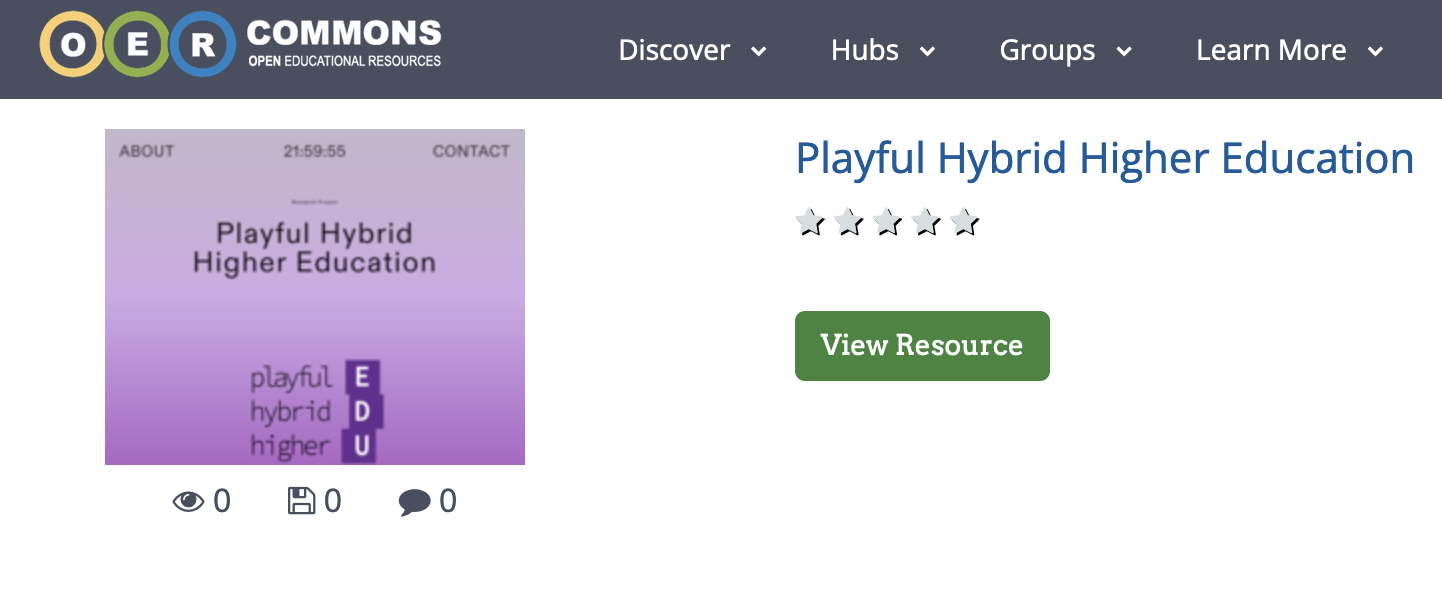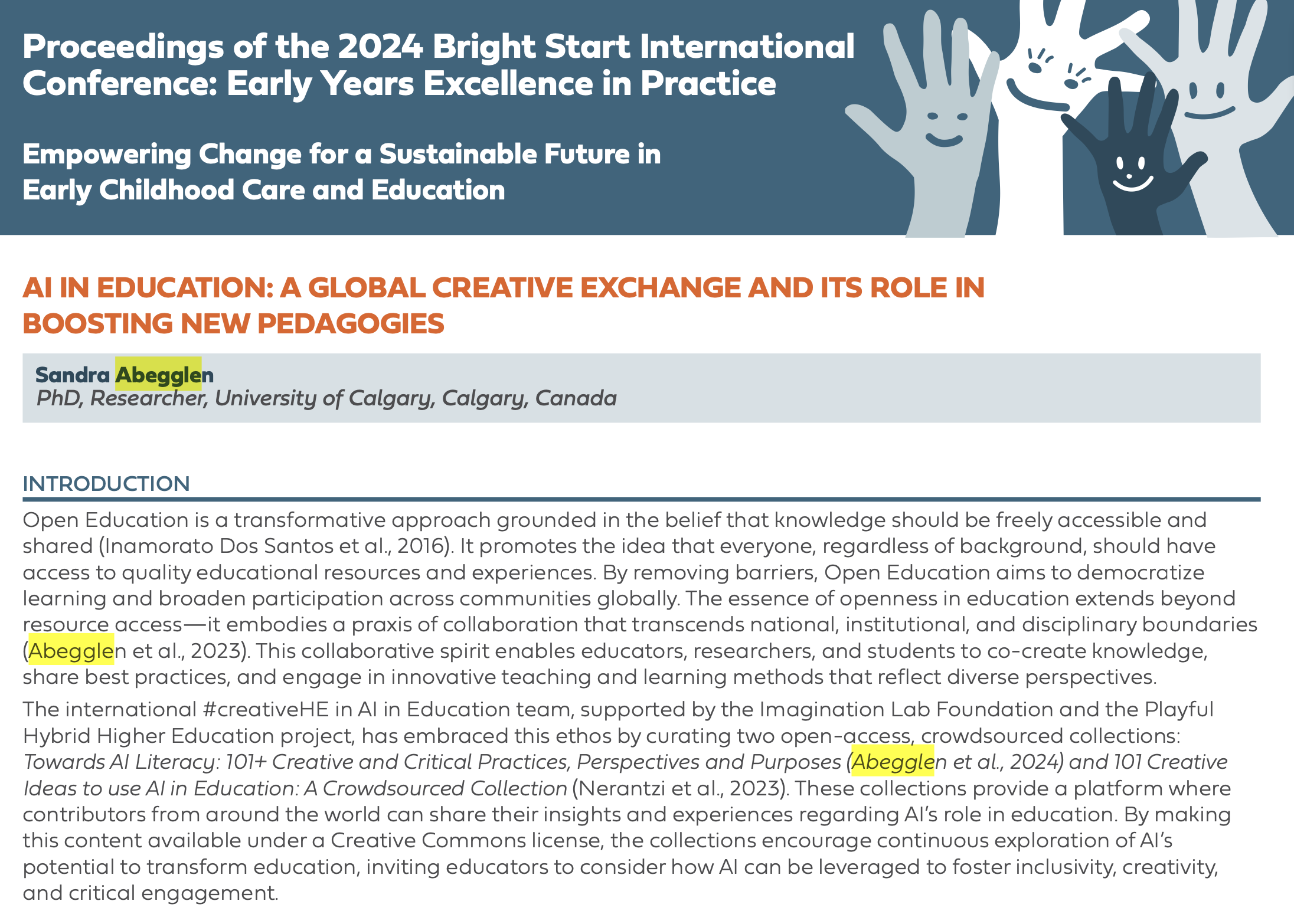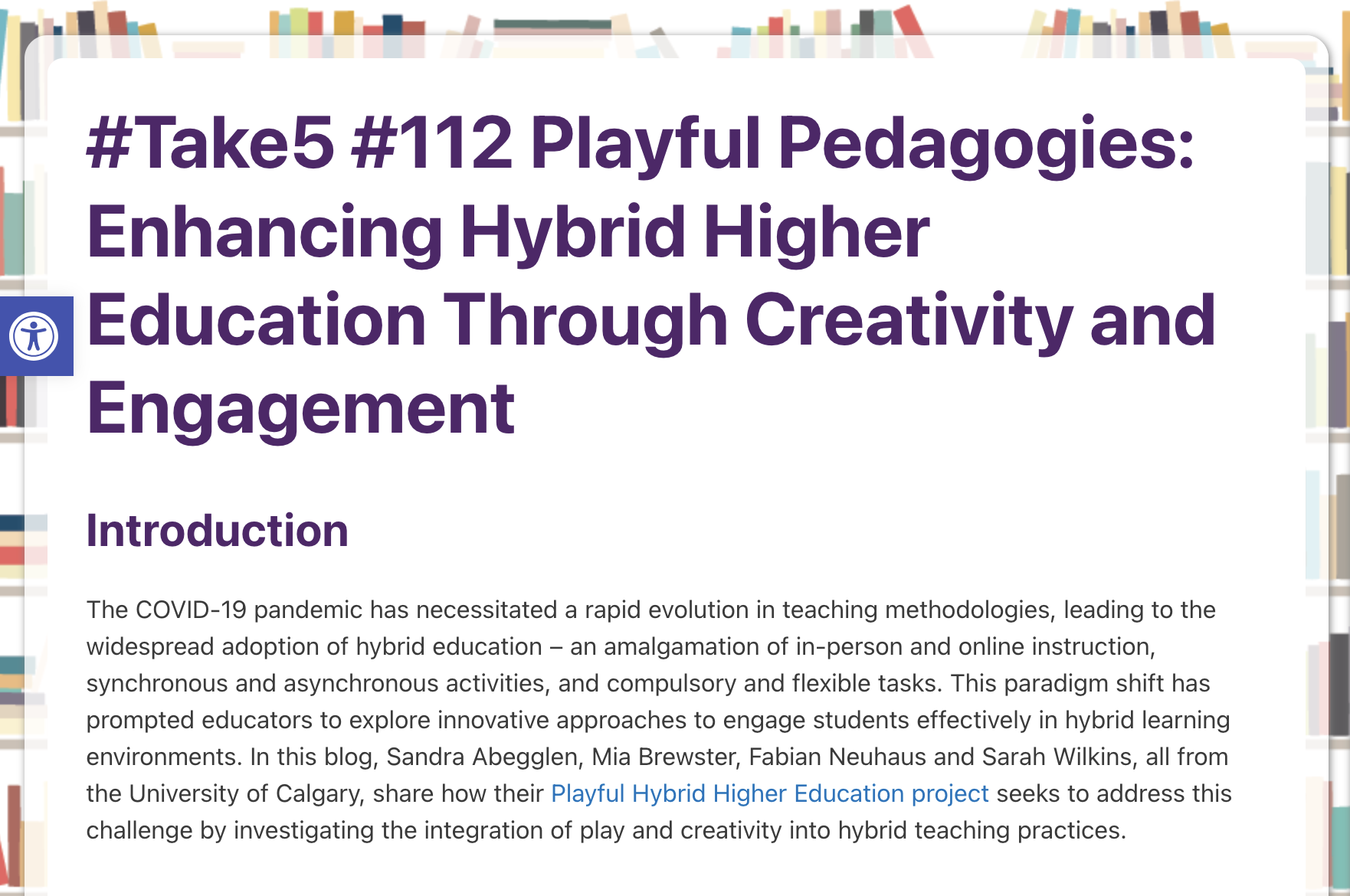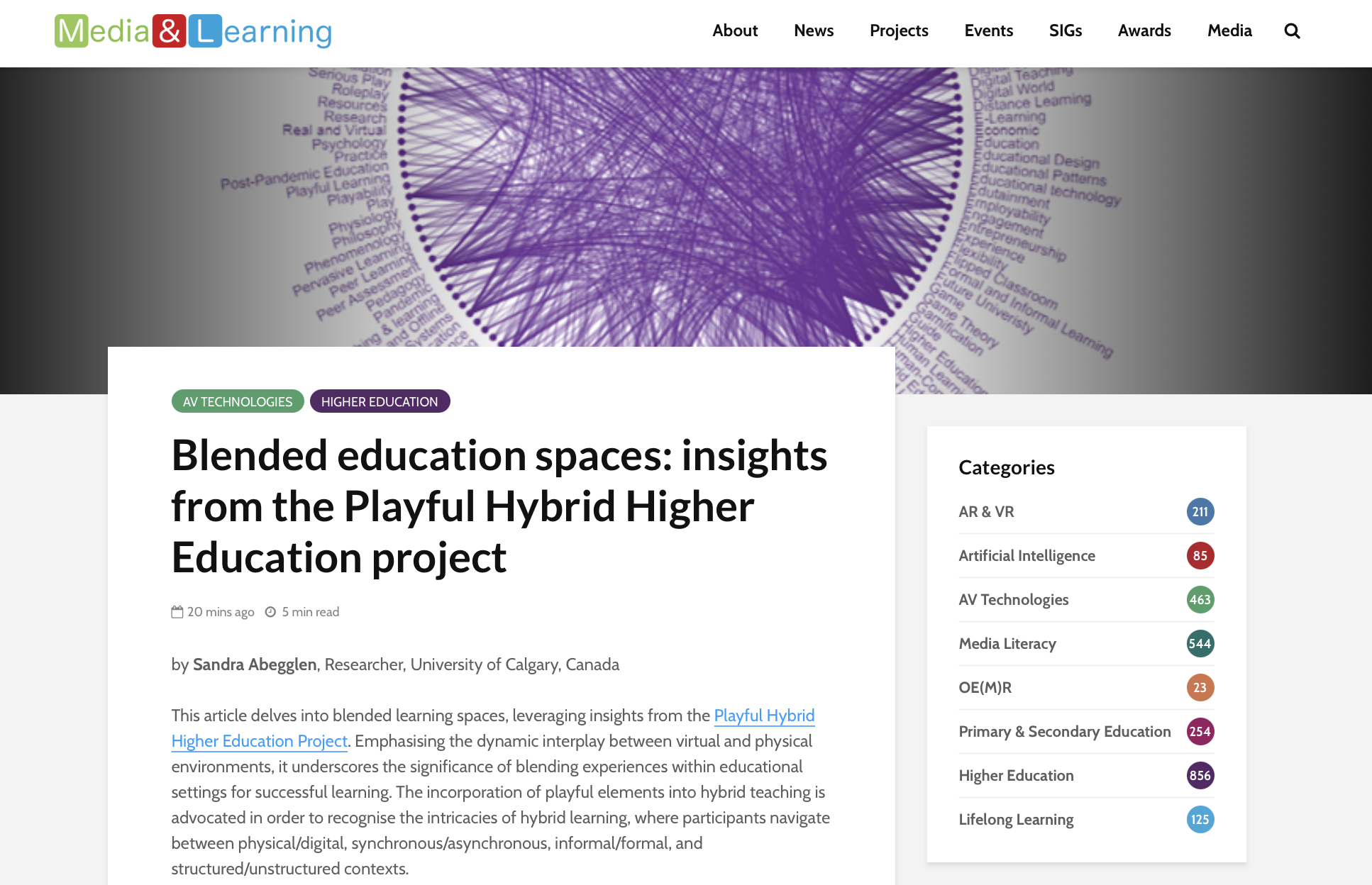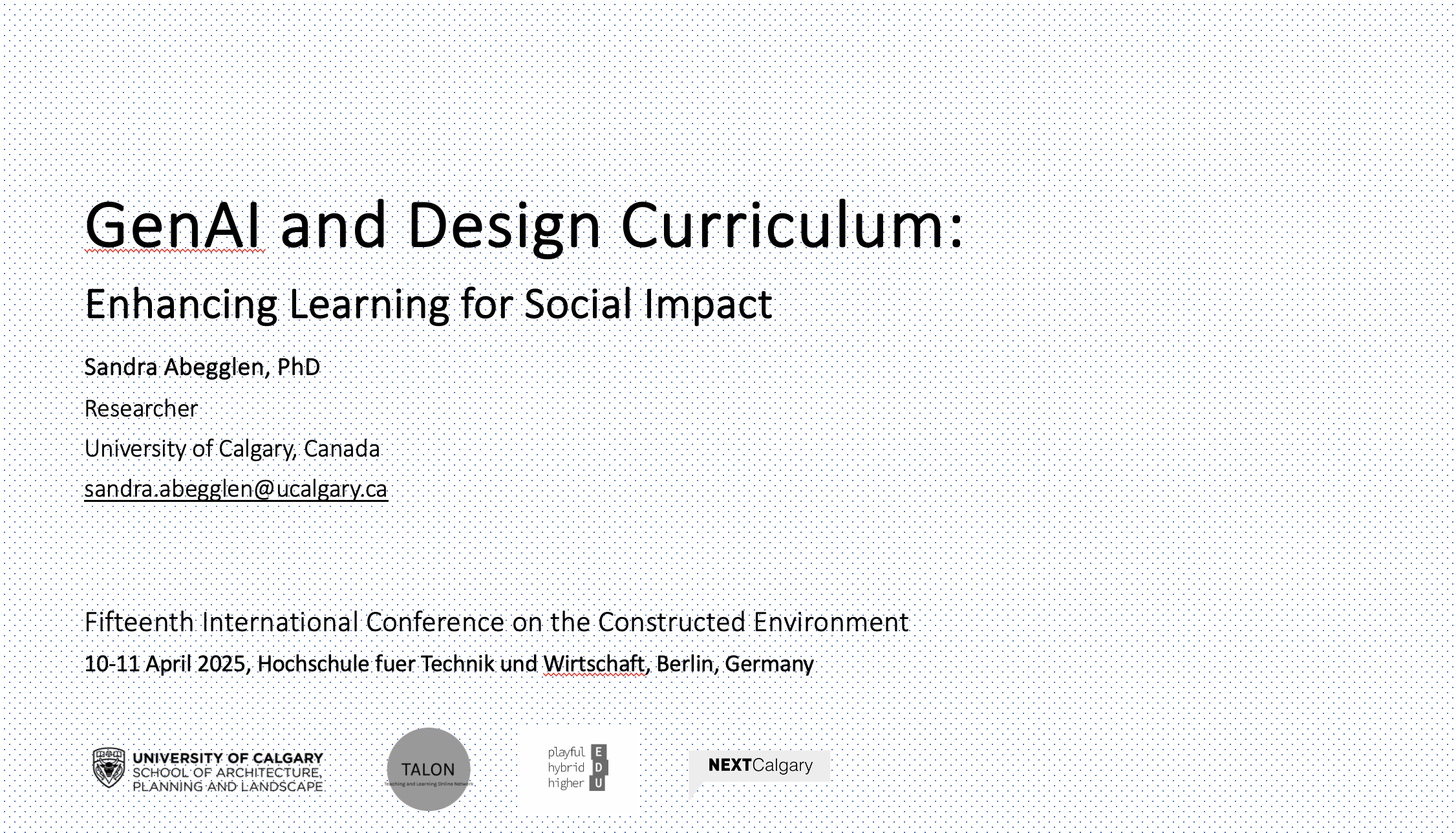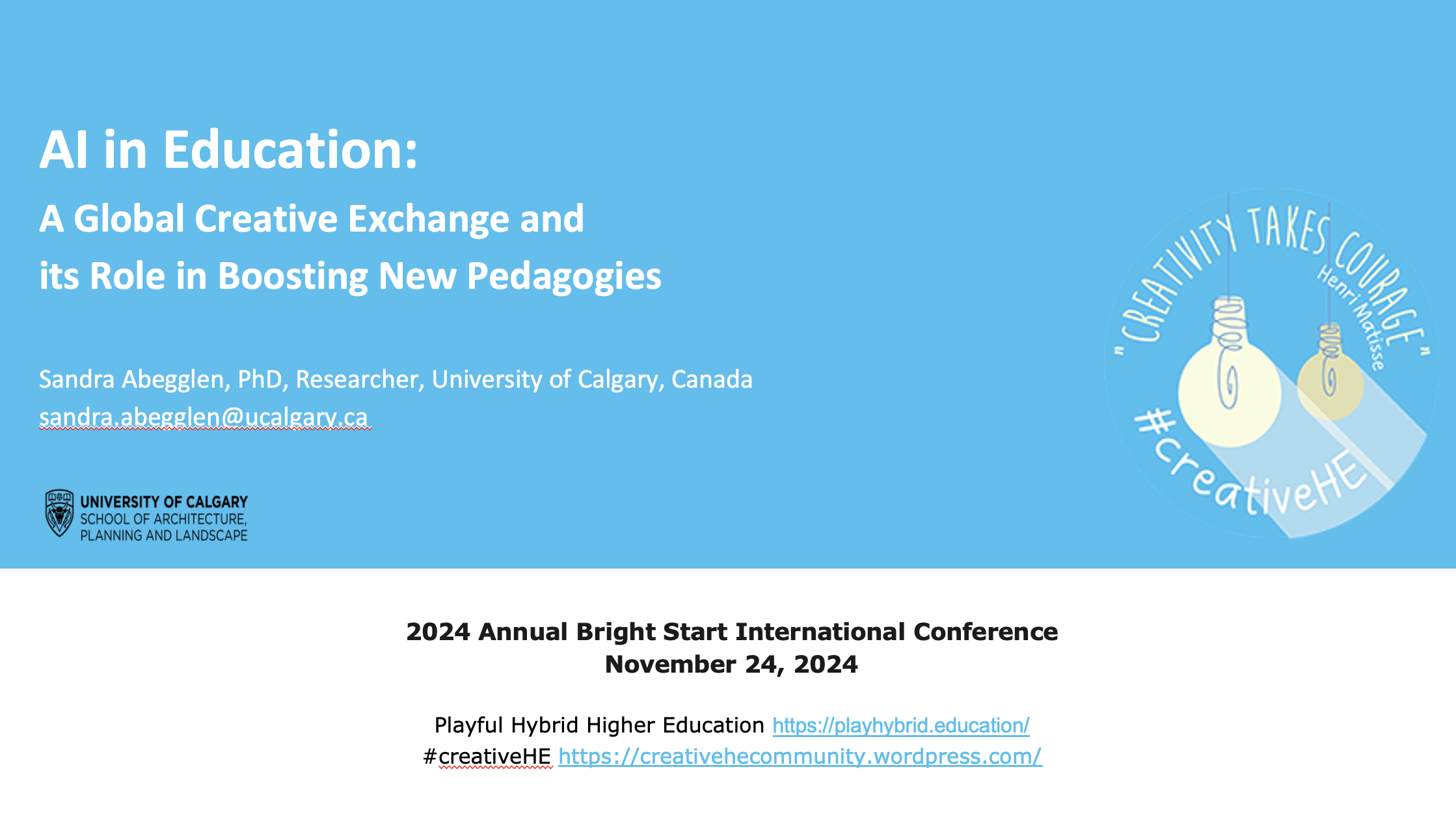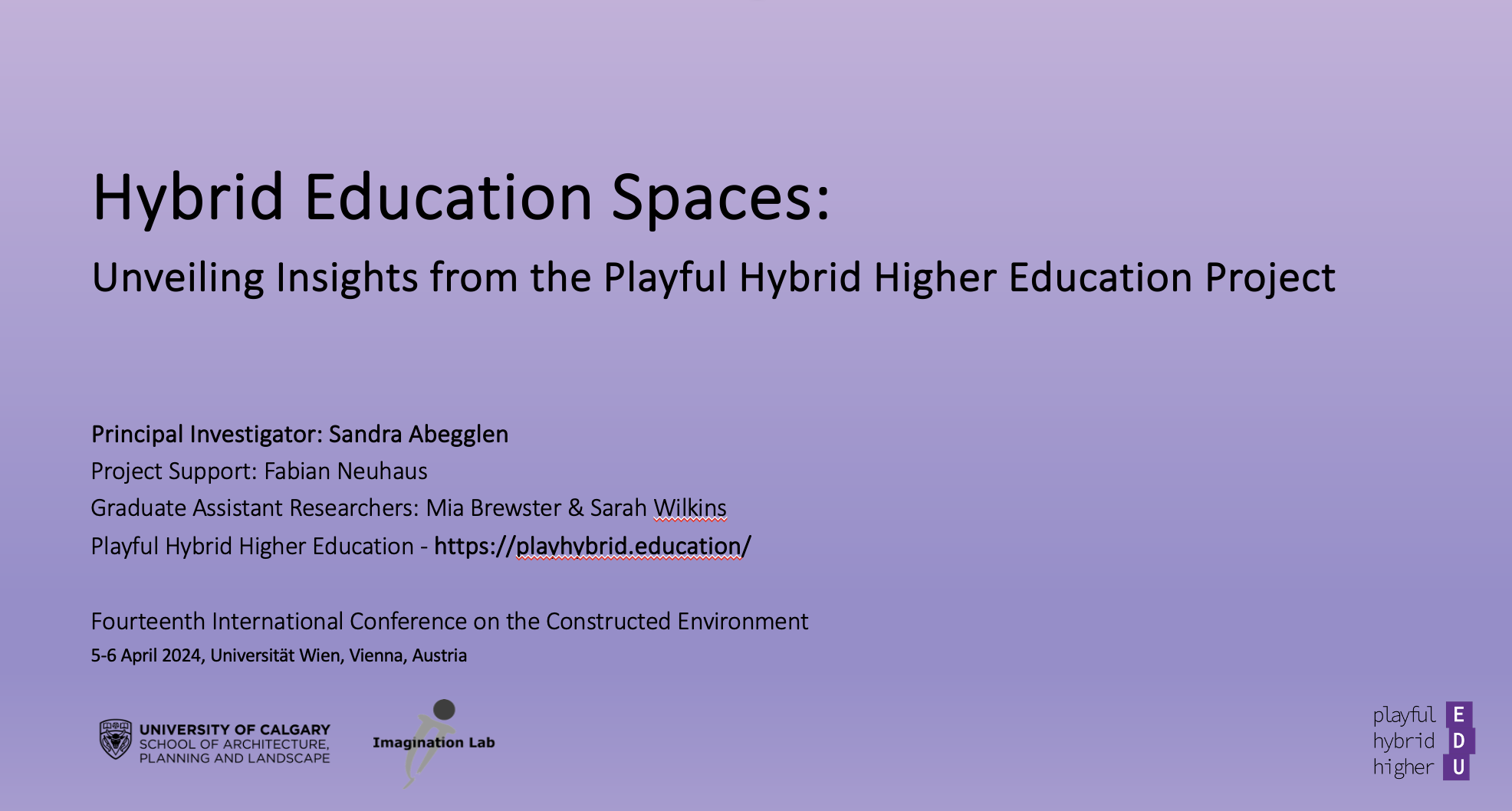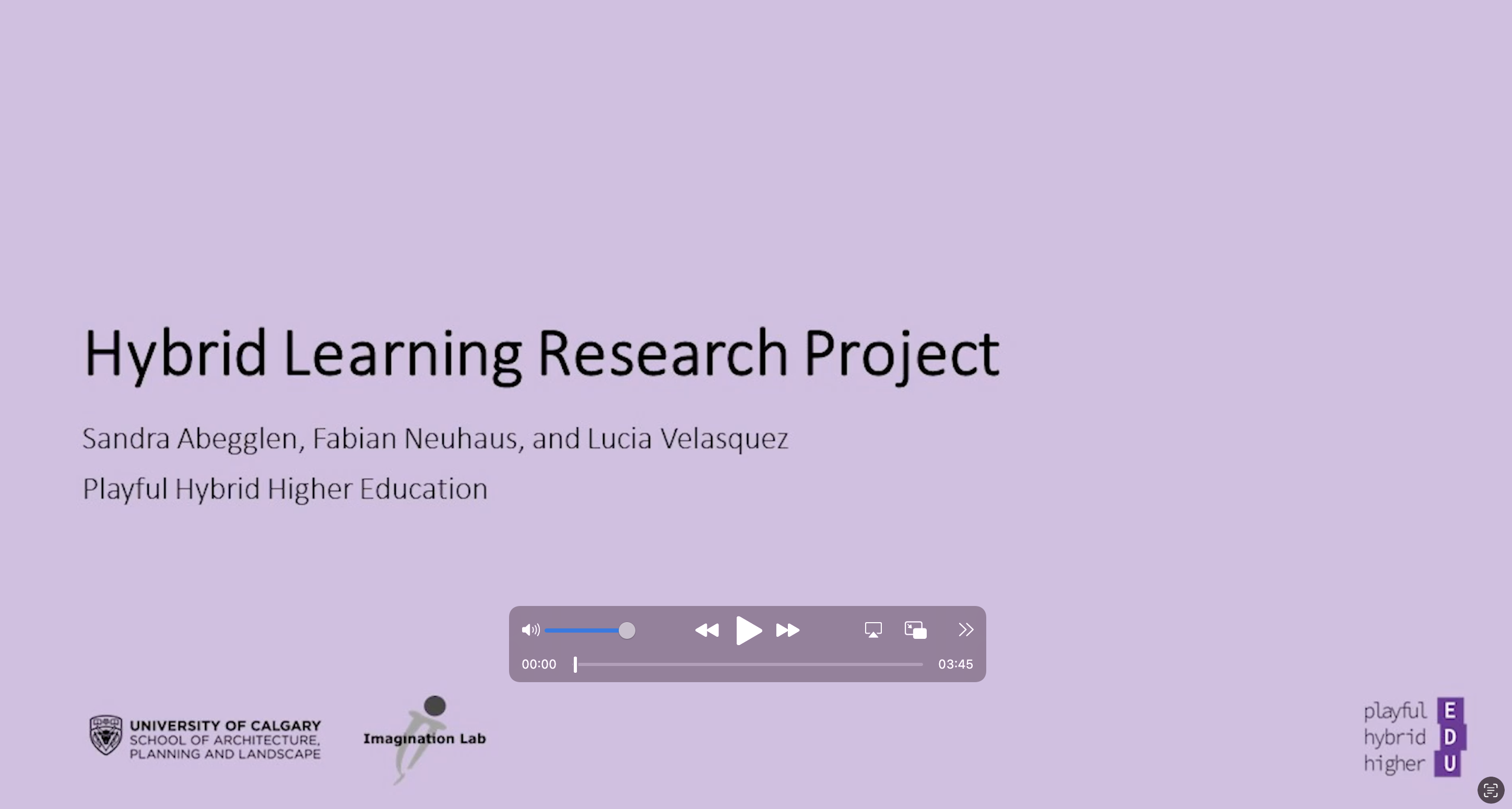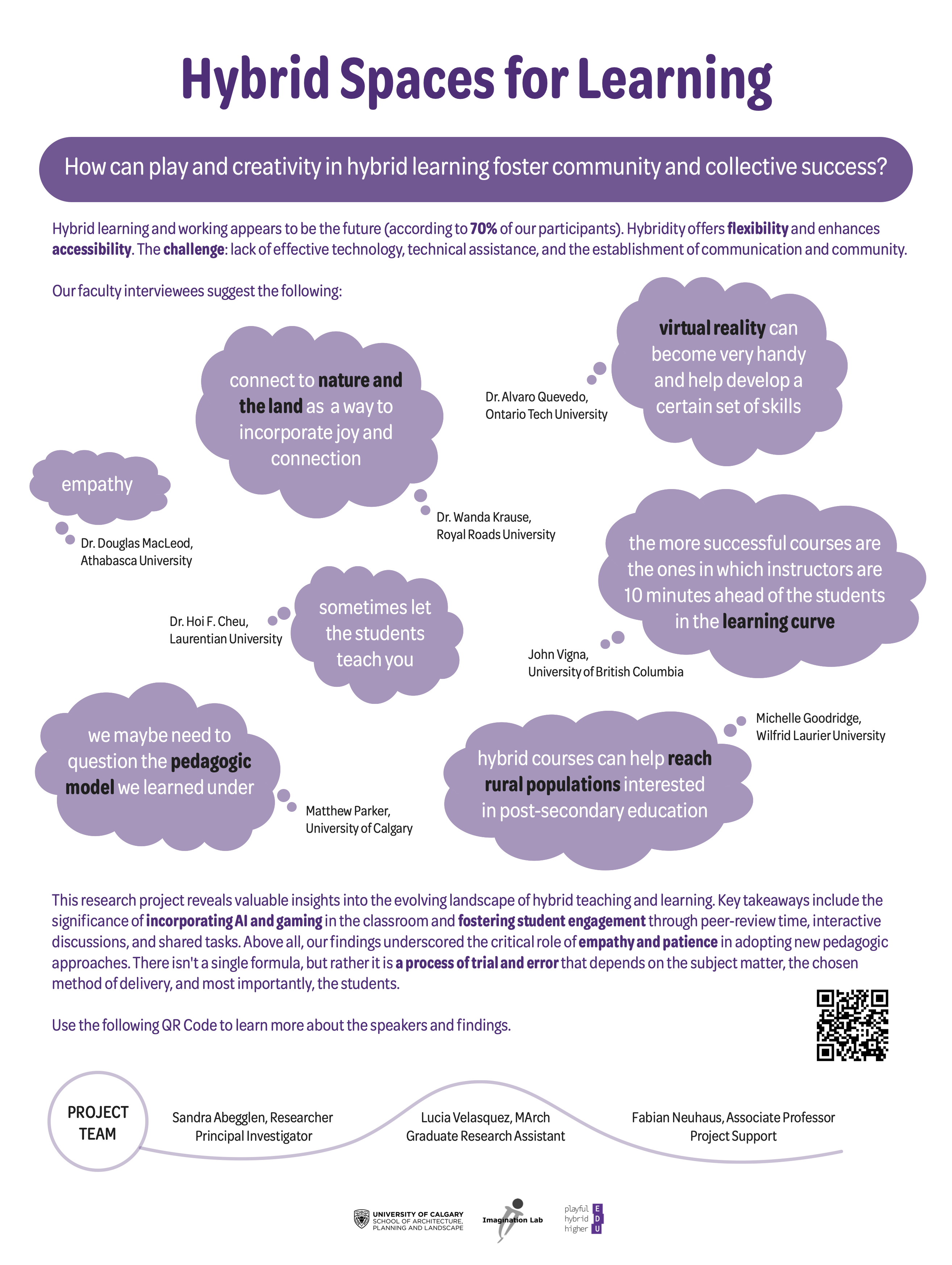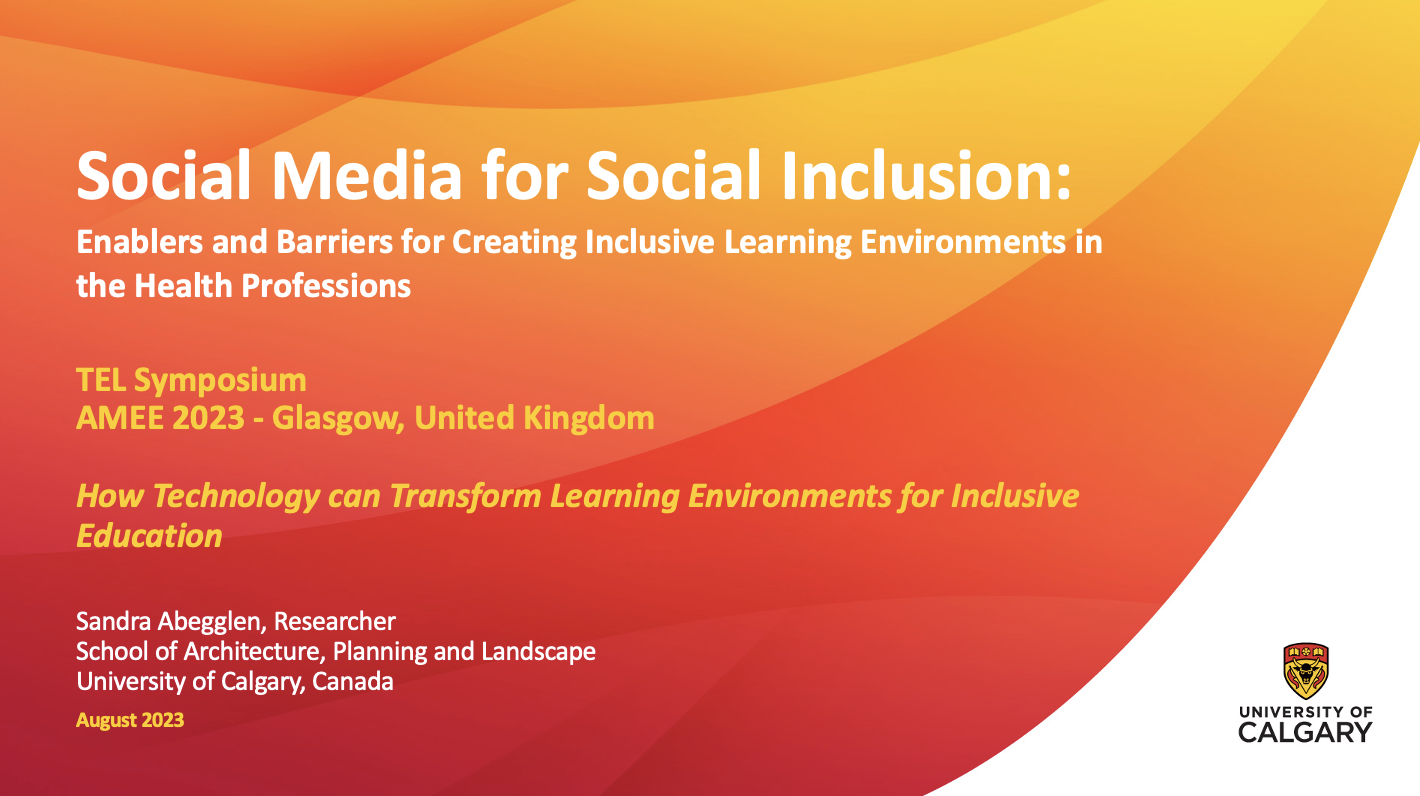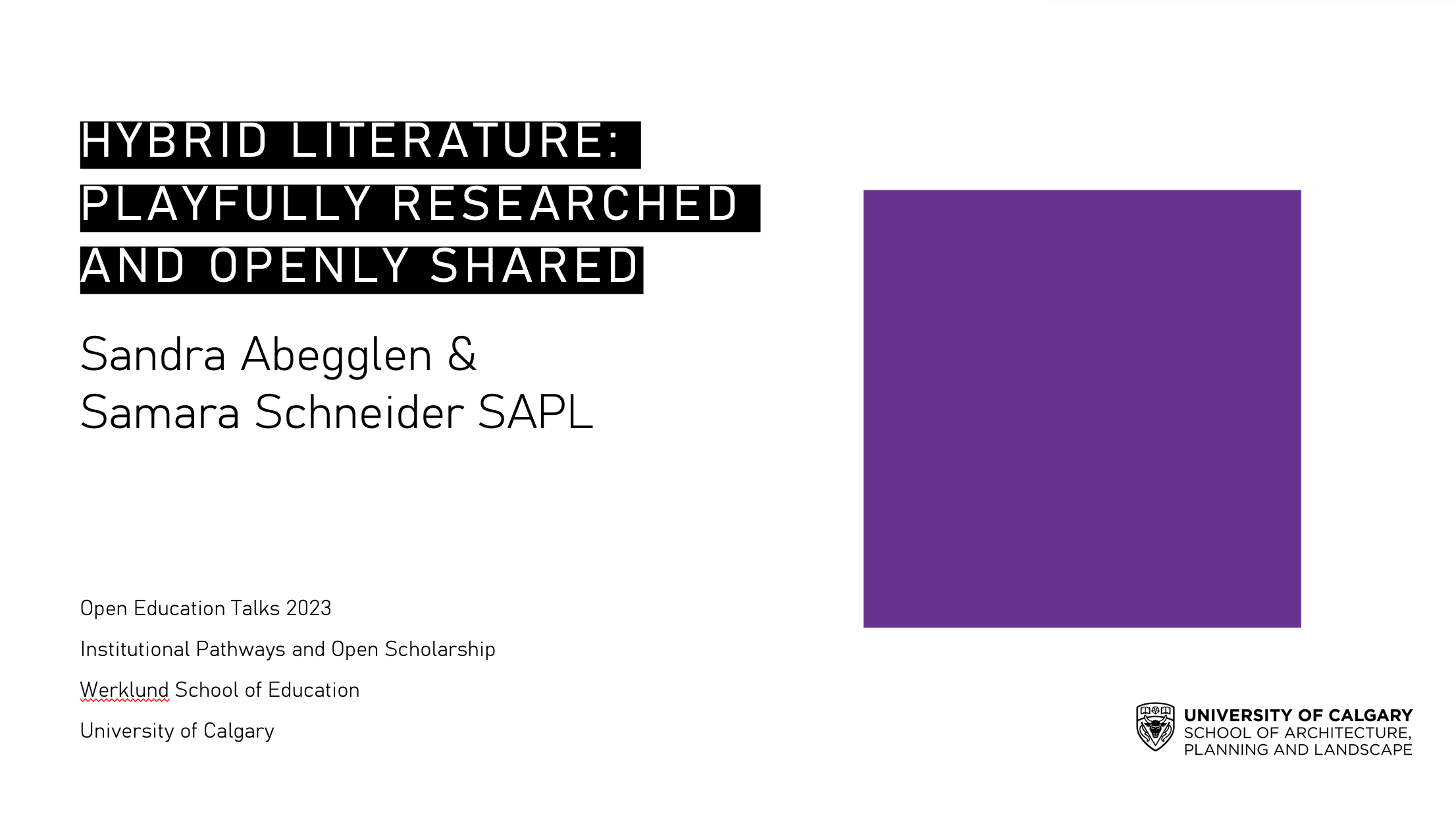OUTPUTS
Awards
Open Education Award 2024 (Open Assets - Open Curation/Repository)
Open Education (OE) Global
Award received for the open-access, crowd-sourced collections: -
101 Creative Ideas to use AI in Education: A Crowdsourced Collection: https://zenodo.org/doi/10.5281/zenodo.8072949
- Towards AI Literacy: 101+ Creative and Critical Practices, Perspectives and Purposes: https://zenodo.org/doi/10.5281/zenodo.11613519
Events
Playful Hybrid Higher Education: Interactive Postcard Exhibit @ the cSpace in Marda Loop, December 02, 2024 - January 25, 2025. https://cspacemardaloop.com/
![]()
This interactive exhibit invites visitors to engage with free, artist-designed postcards that explore themes of community and creative pedagogy in hybrid classrooms.
Designed by Graduate Research Assistant Rachel Denbina, an accomplished illustrator and SAPL Master of Architecture student, the exhibit offers a thoughtful and playful reflection on the future of education.
Playful Hybrid Higher Education Postcards @ Shelf Life Books, December 2024 - January 2025. https://shelflifebooks.ca/
![]()
Take a postcard, share your thoughts, or send it to a friend—fostering connections just like the innovative teaching approaches this research celebrates.
Special Edition Postcard: UFlourish - distributed throughout January 2025 @ the University of Calgary. https://www.ucalgary.ca/
![]()
![]()
Funded through the 2024 UFlourish Micogrant by the University of Calgary Community Mental Health and Well-Being Strategy

Publications
The Playful Hybrid Higher Education project is included in the OER Commons Open Educational Resource Repository: https://oercommons.org/courses/playful-hybrid-higher-education
![]()
OER Commons is a public digital library of open educational resources.
Abegglen, S. (2024). AI in education: A global creative exchange and its role in boosting new pedagogies. Proceedings of the 2024 Bright Start International Conference: Early Years Excellence in Practice. Empowering Change for a Sustainable Future in Early Childhood Care and Education. Hybrid Conference, November 22–24 2024, UCL East, London, United Kingdom. https://conferencebrightstartfoundation.org/2024-publications
![]()
IntroductionOpen Education is a transformative approach grounded in the belief that knowledge should be freely accessible and shared (Inamorato Dos Santos et al., 2016). It promotes the idea that everyone, regardless of background, should have access to quality educational resources and experiences. By removing barriers, Open Education aims to democratize learning and broaden participation across communities globally. The essence of openness in education extends beyond resource access—it embodies a praxis of collaboration that transcends national, institutional, and disciplinary boundaries (Abegglen et al., 2023). This collaborative spirit enables educators, researchers, and students to co-create knowledge, share best practices, and engage in innovative teaching and learning methods that reflect diverse perspectives.
The international #creativeHE in AI in Education team, supported by the Imagination Lab Foundation and the Playful Hybrid Higher Education project, has embraced this ethos by curating two open-access, crowdsourced collections: Towards AI Literacy: 101+ Creative and Critical Practices, Perspectives and Purposes (Abegglen et al., 2024) and 101 Creative Ideas to use AI in Education: A Crowdsourced Collection (Nerantzi et al., 2023). These collections provide a platform where contributors from around the world can share their insights and experiences regarding AI’s role in education. By making this content available under a Creative Commons license, the collections encourage continuous exploration of AI’s potential to transform education, inviting educators to consider how AI can be leveraged to foster inclusivity, creativity, and critical engagement.
Abegglen, S. (2024). Exploring playful hybrid teaching practices in higher education: Insights from the playful hybrid education project. OTESSA Conference Proceedings, 4(1). https://doi.org/10.18357/otessac.2024.4.1.360
![]()
Abstract
The Playful Hybrid Higher Education project [https://playhybrid.education/], based in the School of Architecture, Planning and Landscape at the University of Calgary (Canada) and funded by the Imagination Lab Foundation, explores how play and creativity can be integrated into hybrid classrooms, particularly in response to the shift to blended learning during COVID-19. Through interviews and surveys with Canadian higher education stakeholders, the project aims to provide urgently needed best practice guidance to enhance staff competency and improve student outcomes. This paper presents the preliminary outcomes of the project, with a specific focus on (re)imagining a creative blended university that fosters student success. By sharing initial findings, the paper offers inspiration on how playful and creative approaches can enrich the hybrid learning experience, ultimately contributing to a more engaging and effective higher education environment.
Abegglen, S., Brewster, M., Neuhaus, F., & Wilkins, S. (2024). #Take5 #112: Playful Pedagogies: Enhancing Hybrid Higher Education Through Creativity and Engagement. #Take5. https://aldinhe.ac.uk/take5-112-playful-pedagogies/
![]()
Abstract
The COVID-19 pandemic has necessitated a rapid evolution in teaching methodologies, leading to the widespread adoption of hybrid education – an amalgamation of in-person and online instruction, synchronous and asynchronous activities, and compulsory and flexible tasks. This paradigm shift has prompted educators to explore innovative approaches to engage students effectively in hybrid learning environments. In this blog, Sandra Abegglen, Mia Brewster, Fabian Neuhaus and Sarah Wilkins, all from the University of Calgary, share how their Playful Hybrid Higher Education project seeks to address this challenge by investigating the integration of play and creativity into hybrid teaching practices.
Abegglen, S., Nerantzi, C., Martínez-Arboleda, A., Karatsiori, M., Atenas, J., & Rowell, C. (2024). Towards AI Literacy: 101+ Creative and Critical Practices, Perspectives and Purposes. #creativeHE. https://zenodo.org/doi/10.5281/zenodo.11613519
![]()
As we contemplate the possible revolution that AI/GenAI can bring to the education field, this open-access crowdsourced collection provides multiple inspirations on how we might navigate this ever-changing terrain as confident and competent explorers.Included are
- Reflections and perspectives towards GenAI literacy
- Practice examples by and for education professionals
- GenAI outputs by students for their learning
Testimonials
“This collection of AI stories and examples in education exemplifies citizen science at its finest. It captures the authentic voices of individuals who are actively testing and expanding their AI literacy, sharing their experiences to support and inspire others. Through their contributions, they collectively advance our understanding and application of AI in educational settings, showcasing the true spirit of community-driven learning and innovation. Your feedback is encouraged; this story is only beginning.” Dr Margaret Korosec, Dean of Online and Digital Education, University of Leeds, United Kingdom
“If you are looking for a human-centered approach to integrating GenAI into your classroom, this collection of activities offers a plethora of options for any educator. Search through the multitude of examples to find activities that focus on critical thinking, empathy, annotation, text analysis, deep and analytical thinking, and evidence of learning – to name just a few. As an Instructional Designer and Professor, I could use many of these activities to enrich my current course design and practice. The biggest strength of the book is in its collective knowledge-building design and combined wisdom which makes it inclusive and open for all to find “something” for their classroom.” Dr Verena Roberts, Instructional Designer, Open Learning, Thompson Rivers University (TRU), Canada
“This crowdsourcing approach is an excellent way to bring examples of research and practice in Gen AI to the fore. It is a valuable and timely resource for educators and students as we attempt to find our way, responsibly, into the inevitable, exciting and challenging Gen AI future.” A/Prof Glenda Cox, UNESCO chair in Open education and Social Justice, Centre for Innovation in Teaching and Learning, University of Cape Town, South Africa
“This book is a treasure-trove of interdisciplinary perspectives, ideas and resources offering the reader diverse, critical insights into the meaning of AI literacy. Curated as short, accessible case-studies and vignettes, this book will inspire educators to explore the intricate landscape of AI literacy, prompting us to consider what it means for our teaching and learning practices.” Ruth Powell, Head of Digital Learning Practice, University of the Arts London, United Kingdom
Abegglen, S. (2024, April 09). Blended education spaces: Insights from the Playful Hybrid Higher Education project. Media & Learning. https://media-and-learning.eu/subject/av-technologies/blended-education-spaces-insights-from-the-playful-hybrid-higher-education-project/
![]()
This article delves into blended learning spaces, leveraging insights from the Playful Hybrid Higher Education Project. Emphasising the dynamic interplay between virtual and physical environments, it underscores the significance of blending experiences within educational settings for successful learning. The incorporation of playful elements into hybrid teaching is advocated in order to recognise the intricacies of hybrid learning, where participants navigate between physical/digital, synchronous/asynchronous, informal/formal, and structured/unstructured contexts.
Presentations
Abegglen, S. (2025). GenAI and design curriculum: Enhancing learning for social impact. Fifteenth International Conference on the Constructed Environment, 10-11 April, Hochschule fuer Technik and Wirtschaft, Berlin, Germany.
![]()
AbstractThis presentation shares insights from two research projects exploring the integration of Generative AI (GenAI) into design education, with a focus on socially responsible design practices for creative learning. https://cgscholar.com/cg_event/events/V25en/about
Abegglen, S. (2024). AI in education: A global creative exchange and its role in boosting new pedagogies. 2024 Bright Start International Conference: Early Years Excellence in Practice. Empowering Change for a Sustainable Future in Early Childhood Care and Education. Hybrid Conference, November 22–24 2024, UCL East, London, United Kingdom. https://conferencebrightstartfoundation.org/2024-publications
![]()
Abstract
This interactive talk introduces the open crowdsourced collections from #creativeHE,featuring creative and critical contributions on AI in education from around the globe. Educators, researchers, and students have come together to share diverse practices and perspectives, supported by the Imagination Lab Foundation and the Playful Hybrid Higher Education project. The collections, available under a Creative Commons license, serve as an open data resource, inviting further exploration of AI’s impact on education. Join us to hear insights and contribute to the ongoing dialogue on AI in learning. A key aspect of the discussion will involve examining how these new and evolving practices can be adapted to support inclusivity and creativity in early childhood settings and how educators can support such practices.
https://conferencebrightstartfoundation.org/
Abegglen, S., Brewster, M. & Wilkins, S. (2024). Exploring Playful Hybrid Teaching Practices in Higher Education: Insights from the Playful Hybrid Higher Education Project. #OTESSA24, June 17-21 2024, Online.

Abstract
The COVID-19 pandemic has catalyzed a swift transformation in education, prompting the widespread adoption of hybrid approaches, a fusion of in-person and online instruction, across university settings. This shift has compelled faculty to embrace novel pedagogical methodologies to effectively engage students. The Playful Hybrid Higher Education project [https://playhybrid.education/] investigates student and faculty perceptions towards hybrid teaching and learning, as well as the effective integration of play and creativity in hybrid environments, aiming to offer guidance for educators navigating the complexities of hybrid education. As hybrid education emerges as the future norm, there arises an exigent need for actionable recommendations to support faculty in crafting new teaching and learning experiences. This poster presentation unveils preliminary findings from our project, derived from surveys administered to faculty and students within the Canadian higher education landscape. Through a synthesis of survey data and scholarly literature, this poster endeavors to provide practical insights and evidence-based recommendations, with the overarching goal of enriching teaching and learning within hybrid higher education and to provide opportunity for discussion on emerging pedagogical approaches. To empower tomorrow's learning, we will need to embrace the hybrid experience.
https://otessa.org/2024/
Abegglen, S. (2024). Hybrid Education Spaces: Unveiling Insights from the Playful Hybrid Higher Education Project. Fourteenth International Conference on The Constructed Environment, April 5-6 2024, Universität Wien, Vienna, Austria.
![]()
Abstract
This presentation delves into hybrid learning spaces, leveraging insights from the Playful Hybrid Higher Education Project [https://playhybrid.education]. Emphasizing the dynamic interplay between virtual and physical environments, it underscores the significance of place and identity within educational settings. The incorporation of playful elements into hybrid teaching is advocated for to recognize the intricacies of hybrid learning, where participants navigate between physical/digital, synchronous/asynchronous, informal/formal, and structured/unstructured contexts. Additionally, inclusive design principles are highlighted, focusing on addressing human needs in these in-between spaces and affirming rights to access: to create an empowering hybrid education landscape.
https://constructedenvironment.com/2024-conference
Velasquez Bustos, L., Abegglen, S. & Neuhaus, F. (2023). Playful Hybrid Higher Education Research Project. AMPS, Teaching Beyond the Curriculum, Focus on Pedagogy 2023.
![]()
Abstract The Playful Hybrid Higher Education project, situated within the School of Architecture, Planning, and Landscape, explores the experiences of faculty and students in the hybrid classroom. The goal is to provide essential guidance for educators navigating this evolving model of education, with an emphasis on playful and creative pedagogy. This research seeks to answer a pivotal question: How can faculty effectively infuse play and creativity into hybrid higher education, fostering community and collective student success? It's a timely endeavor as hybrid learning takes on a new role in education's future.
https://amps-research.com/conference/teaching-2023/
Velasquez Bustos, L. (2023, October 12). Hybrid Spaces for Learning. Research Showcase Poster Show 2023. City Building Design Lab, School of Architecture, Planning and Landscape, University of Calgary, Canada.
![]()
![]()
Abegglen, S. (2023, August 07). Social Media for Social Inclusion: Enablers and Barriers for Creating Inclusive Learning Environments. AMEE TEL Committee Preconference Symposium. Annual AMEE Conference, Glasgow, United Kingdom.
![]()
Invited pre-conference keynote.
https://amee.org/AMEE/Conferences/Conferences/AMEE_Conferences/AMEE/Conferences/AMEE-2023-landing.aspx?hkey=f77d59f9-1992-47a2-9588-d6084a36e723
Abegglen, S., Neuhaus, F. & Schneider, S. (2023, April 26-28). Hybrid Play for Collective Learning. 2023 Postsecondary Conference on Learning and Teaching. Taylor Institute for Teaching and Learning, University of Calgary, Canada.
Abstract
With the emergence of the Covid-19 pandemic, academics across the spectrum have been forced to adapt their teaching. In this context, hybrid education has gained momentum, an approach that combines face-to-face and online learning, as classes had to be shifted continuously between the digital and the physical classroom. The Playful Hybrid Higher Education project, situated in the School of Architecture, Planning and Landscape, explores faculty and student experiences in the hybrid classroom to develop guidance for faculty on the new education model. In this digital poster presentation, we share our experiences of doing the literature review differently, more playfully, and showcase initial results. We argue that research projects like this can help foster not only the development of new pedagogical approaches but also creative academic (research) practice. Hybridity and play for collective and sustainable education growth.
https://taylorinstitute.ucalgary.ca/conference
Schneider, S. (2023, February 12). Hybrid Higher Education: Playful Research. Peer Beyond 2023, Graduate Research Conference, University of Calgary, Canada.

With the emergence of the Covid-19 pandemic, academics across the spectrum have been forced to adapt their teaching. In this context, hybrid education has gained momentum, an approach that combines face-to-face and online learning, as classes had to be shifted continuously between the digital and the physical classroom. The Playful Hybrid Higher Education project, situated in the School of Architecture, Planning and Landscape at the University of Calgary, explores faculty and student experiences in the hybrid classroom to develop guidance for educators on the new education model. In this poster, I share my experiences as Graduate Assistant Researcher undertaking the literature review. Highlighted and discussed is the playfully approach taken, with initial results showcased. I argue that research projects like this not only help develop a deeper understanding about learning and teaching but also research methodologies. Play is an effective tool to foster curiosity and literacy!
https://gsa.ucalgary.ca/events/peerbeyondsymposium/
Abegglen, S. & Schneider, S. (2023, March 01). Hybrid Literature: Playfully Researched and Openly Shared. Open Education Talks 2023.
![]()
AbstractWith the emergence of the Covid-19 pandemic, academics across the spectrum have been forced to alter their teaching. In this context, hybrid education has gained momentum, an approach that combines face-to-face and online learning, as classes had to be shifted continuously between the digital and the physical classroom. The Playful Hybrid Higher Education project (funded by the Imagination Lab Foundation and situated at the University of Calgary) explores faculty and student experiences in the hybrid classroom to develop guidance for educators on the new education model. In this presentation, we share our experiences of doing the literature review differently, more playfully, and showcase initial results. We argue that research projects like this can help foster not only creative pedagogy but also creative academic (research) practice. As Carl Gustav Jung states: “The creation of something new is not accomplished by the intellect, but by the play instinct acting from inner necessity. The creative mind plays with the objects it loves.”
https://oetalks.opened.ca


